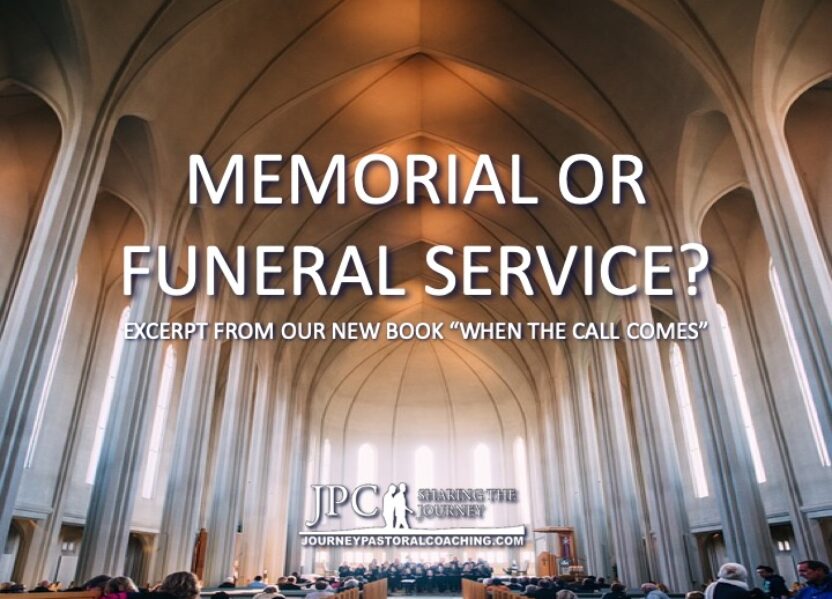MEMORIAL OR FUNERAL SERVICE?
Editor’s Note: Journey is pleased to announce that our new resource for pastors, “When the Call Comes: A Pastor’s Guide to Funerals” has just been released. This book (paper and ebook formats) helps ministers prepare themselves to walk with families in grief – from the moment the call comes informing the pastor that a death has occurred all the way through to the final “Amen” of the graveside service. Two weeks ago, the Journey blog post featured the preface to “When the Call Comes.” This post is a look at a chapter from the book. See below to learn how to purchase copies.
“Death is the supreme festival on the road to freedom.”
Dietrich Bonhoeffer
In considering the question of whether to conduct a funeral or a memorial service, we can first ask a more basic question: why observe any ceremony or rite of death? What is gained by a public observance?
Consider first the history of funerals. Rituals marking death are not a recent invention. Records of burial ceremonies can be found throughout human history, in all cultures and religions. Conducting some kind of public observance seems to be a universal human response to the end of life. We seem to have an innate need to give public honor to an individual who has died, and by inference, a need to make a public statement of the sanctity of all human life. In cultures where individual deaths are not marked by ritual, we see a parallel denigration of human life. Examples of such sacrilege are evident in the mass graves of the Nazis, Pol Pot’s Cambodian Communists, and the Soviet Socialists. In these cases and others like them, not only were people massacred, but their families were denied the right of marking their passing with meaningful rites of death.
The Bible, both Old and New Testaments, records the marking of the end of life with public ceremonies of mourning and honor. One example is the story of the Widow of Nain (Luke 7). Jesus and His disciples enter a village where they meet a funeral procession made up of the grieving mother, the funeral bier, the bearers of the body, and a crowd of mourners who accompany the body to its place of rest outside the city gates. The early church, in all likelihood, continued the burial practices of their Jewish ancestors. Church history tells the story of similar public observances to honor those who have died. From their earliest days, Jewish and Christian people have marked the end of life with sacred public ceremonies, simple or otherwise.
This is has been the practice of the people of God because God Himself holds all human life sacred. God creates every human being in His image (Genesis 1:27). Every human being is individually and personally formed by God (Jeremiah 1:4-5) to be with Him eternally, body and soul. At death, the body and the soul may separate for a time (James 2:26), but neither ceases to exist. At the Last Day, God will resurrect the body of every human being in history. He will then reunite our bodies with our souls and dispatch each person to the eternal destination each of us has chosen during this life: to be with God eternally or to be without God eternally. Again, the point is clear: in each case, believer or nonbeliever, God will resurrect his or her body from its place among the earth, ashes, and dust of history, to reunite it with the soul for eternity. Each human life – body and soul – is sacred. And so, when body and soul are temporarily separated at death, it is a sacred moment, one worthy of public observance.
It is highly significant that in both Testaments, the body is assigned great value in the eyes of God. Consider this evidence. First, the body is assigned personhood. When the Bible speaks of the burial of a body it sometimes also states that a “person” is being buried (see the burial of Jesus in Mark 16). Again, this teaches us that a person is not just a soul, but a soul and a body. Second, at creation, while God gave every species of animal its own unique body, He chose to breathe soul life only into the body of a human being, Adam, and so, into the bodies of all human beings. Third, the Bible teaches that the body is the Temple of the Holy Spirit (I Corinthians 6:19). Finally, as already seen, at the coming of the Lord, the body of the believer will be resurrected, glorified, and reunited with the soul to go on living eternally in new heavens and on a new earth. Living or dead, the human body has great value in the sight of God.
While the Bible does not command burial rituals, it does reveal the value God places on human life. Because of this, the sanctity of human life, public ritual has been a part of Christian and Jewish tradition from time immemorial.
What then are the purposes of public ceremonies to mark the passing of an individual? We can identify at least ten:
- To publicly affirm that the death of an individual has taken place;
- To confront the reality of death and define it;
- To allow people to consider the eventuality of their own death;
- To say goodbye to a loved one in a meaningful way;
- To give loved ones opportunity to honor the life of the deceased;
- To give closure and help people grieve in a healthy way;
- To allow mourners to give and receive comfort;
- To present and worship the Creator and Savior of the world;
- To give testimony of faith in Jesus Christ as Savior;
- To present God’s offer of eternal life with Him;
- To teach what awaits those who die in Christ and without Christ.
It is clear that there is great significance in the custom of funerals. Again, human history, the example of Scripture, the sanctity of life, the personhood of soul and body, and eternal life speak to the value of gathering to mark the death of a loved one. The purposes listed above give reason as well to the great value of a shared public mourning and the giving of honor on the occasion of the end of life.
In recent years, the memorial service is more and more replacing funeral and graveside services. The reasons for doing so are often practical: time, family travel, weather, the means of burial, etc. For others, the reasons are philosophical, or even anti-philosophical.
As undershepherds of Jesus, it is our divine charge not just to officiate a service, but to help mourners focus on the transcendent and eternal truth of God, i.e., life after death and the overarching meaning of life. We are not hirelings whose job is to conduct burial rituals or to lead in a celebration of an individual who walked the planet for a time. We are servants of God, undershepherds of the One who gave His life on the Cross that all might receive eternal life. Therefore, our focus in life and in death is always on Jesus and the eternal life He purchased for us with His Cross. This is our ministry, be it in church worship or in a funeral service. This is most effectively accomplished in a funeral rather than in the memorial service. Let me explain.
The memorial service, by definition, is “a recounting of memories,” a looking back at a life lived in the past. It addresses neither the present nor the future. It does not address present sorrow or offer hope for the future and life beyond the grave. The memorial service avoids awkward questions like, “What is death?” “Where is the deceased?” and, “What awaits each of us after our heart beats for the last time?” In effect, the memorial service hides from us the most basic question of the soul: what is the meaning of life? It denies our need of a savior and God’s provision of that savior in Jesus Christ, His Son.
The funeral is different in that it addresses the past, the present, and the future. It honors the life lived in the past, it brings God’s comfort in the present, and it offers hope for an eternal future. It does this by asking and answering the question asked by every human soul (and especially at death): what is the meaning of life, now and forever? The servant of Jesus Christ cannot miss this critical opportunity, this intersection of life and death where the questions of people’s hearts can meet the truth of God as revealed in Jesus and His Gospel.
This is not to say that the memorial service has no place. It is only that, by design, it cannot do what a funeral can do. Families often hold a memorial service in a second, distant location, a service of celebration for those of the faith who were not able to attend the funeral. But because a funeral focuses mourners’ attention on the Gospel, as a servant of God, I always advise families to hold funeral services rather than a memorial service only.
If you knew what God knows about death
you would clap your listless hands.
George MacDonald
________________
Editor’s Note: “When the Call Comes” helps pastors address the many ministry responsibilities – and privileges – associated with funeral ministry: meeting with the family for the first time; funeral service planning; the visitation; the funeral services; the graveside and more. Included are funeral resources designed to help the minister prepare. “When the Call Comes” (paperback version) is available here on the Journey website (go to the home page and click on “When the Call Comes) or at your favorite online retailer (paperback and ebook versions).
————————
NOTE: Journey Pastoral Coaching exists to provide pastoral coaching to Millennial ministers.
Saddled with large student debt, just beginning to set up homes and start families, and serving in low paying first and second positions, Millennials are those who most desire but can least afford to pay for pastoral coaching.
So we offer it to them at NO COST: Our members do not PAY for coaching; they EARN it by investing in each other.
We are able to do so thanks to the faithful and generous support of individuals and churches like yours who want to see young leaders not only enter the ministry, but remain in the ministry. If you or your church would like to help Millennial ministers in 20 US states and 5 nations build strong for a lifetime in ministry, please click here to contact us by email or to support Journey monthly or with your one-time gift. Thank you.
We also invite you to click and subscribe to our twice-monthly blogs at journeypastoralcoaching.com
“In the early years when I was becoming a pastor, I needed a pastor.”
Eugene H. Peterson, The Pastor: A Memoir



